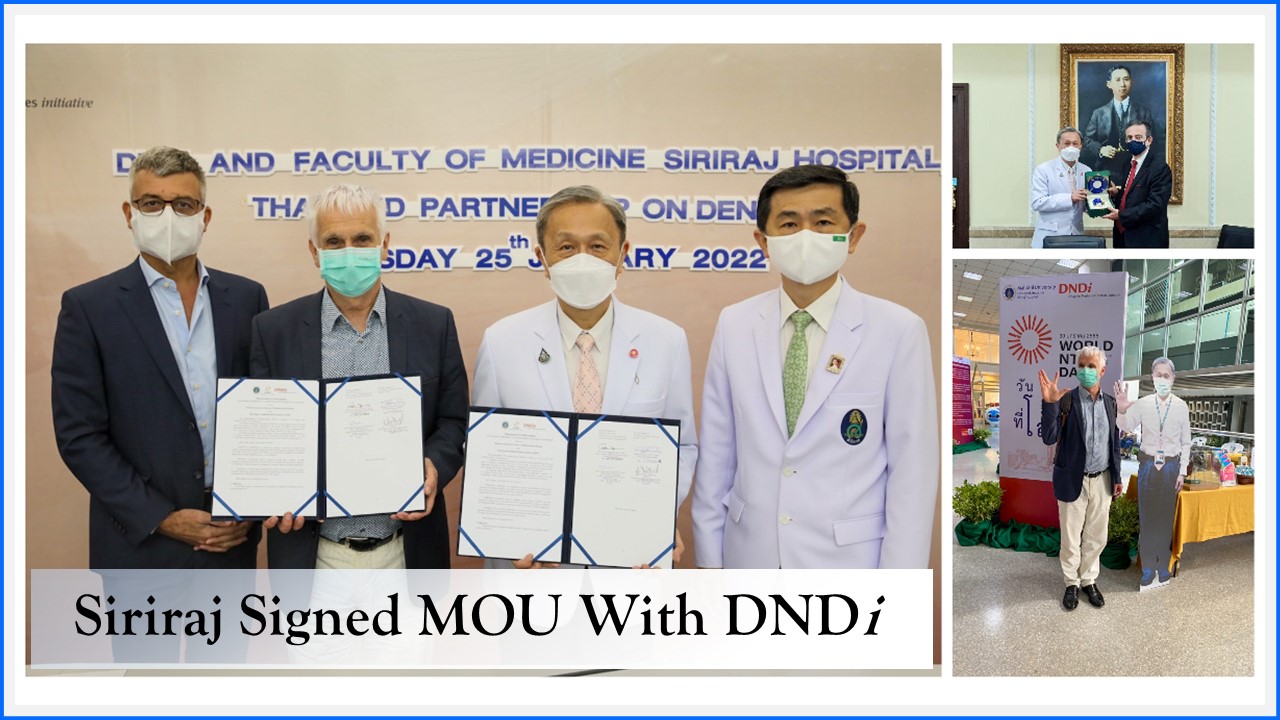On January 25th, 2022, The Faculty of Medicine Siriraj Hospital, Mahidol University, has signed the Memorandum of Understanding (MOU) with an international non-profit medical research organization Drugs for Neglected Diseases initiative (DNDi) in a collaboration that aims to develop a safe, affordable and effective treatment for dengue, within five years.
Through this agreement, Faculty of Medicine Siriraj Hospital, Mahidol University becomes the first member of an ambitious global partnership to be led by dengue-endemic countries, that is dedicated to facilitating and coordinating research to find and deliver new therapeutic solutions for dengue.
“Even in the midst of the COVID-19 pandemic, it is important we don’t lose sight of our efforts to tackle other diseases which affect millions of people around the world.” said Prof. Dr. Prasit Watanapa, Dean of the Faculty of Medicine Siriraj Hospital, Mahidol University.
“When it comes to neglected tropical diseases – the most serious of which in Thailand is dengue fever, the goal of all organizations, particularly the health authorities at Siriraj, is to eliminate the disease. Despite extensive research and development of treatments for dengue fever and progress on vaccines, we have not yet achieved sufficient results. The collaboration with DNDi is a critical first step toward working with international organizations to promote and develop the potential of Thailand as one of Southeast Asia’s most dependable medical research and development facilities as well as to contribute to the control of dengue fever in Thailand permanently.” said Dean Prasit.
Dengue is a climate-sensitive neglected tropical disease, it is one of the top ten threats to global public health. Symptoms can include fever, nausea, vomiting, aches, and muscle, joint, or bone pain so excruciating that the disease is also known as ‘breakbone fever’. If the infection progresses to severe dengue, affected people may experience shock, internal bleeding, and organ failure – there is also a risk of death.
Yet, despite an estimated 390 million dengue infections each year in more than 100 countries worldwide, there is no specific treatment available. This not only causes immense suffering but places significant pressure on already overburdened health systems.
More than 70% of the global dengue burden is in Asia where severe dengue has become a leading cause of hospitalization and death among children and adults in many countries. Thailand sees tens of thousands of dengue cases every year, with major outbreaks every 2-3 years, such as in 2019 when an epidemic swept South-East Asia and Thailand saw more than 131.000 cases.
The new partnership aims to find a new therapeutic solution to help treat dengue fever, prevent progression to severe disease and help relieve pressure on health systems.
DNDi has a long history of running international medical projects working with global experts to coordinate activities that ensure equitable and fast sharing of knowledge, data, and science – as well as mobilizing donors.
“We are delighted to have Thailand onboard.” said Dr. Bernard Pécoul, Executive Director of DNDi and Prince Mahidol Award Laureate. “There is no more time to lose in addressing the need for safe and effective dengue treatments that are affordable and accessible for all patients. To succeed it is critical that dengue-endemic countries are in the lead.”
“Finding treatment solutions is all the more critical as dengue spreads at a rapid pace – in part as a result of climate change predicted to further intensify the impact of dengue in endemic areas as well as to see it spread to previously unaffected areas.”
The number of dengue incident cases increased by 85% from 1990 to 2019. Rising temperatures linked to climate change are predicted to see faster viral amplification of the disease, as well as increased survival, reproduction, and biting rates of the mosquitoes which carry it. The number of people at risk of dengue is estimated to reach 60% of the world’s population by 2080, as a result of climate change, rapid urbanization, and population growth.
Through this collaboration, DNDi and the Faculty of Medicine Siriraj Hospital, Mahidol University will work together on joint projects to progress preclinical investigations of potential treatments, test the efficacy of several repurposed drug candidates, and implement clinical trials of the most promising drug candidates. At the same time, it will coordinate efforts to help overcome knowledge gaps and expedite clinical research and regulatory approvals, including addressing unmet needs such as diagnostics. The partnership will work together to raise funds and mobilize resources while openly sharing research knowledge.
DNDi is in the process of signing a similar agreement with India and is fast progressing discussions with Malaysia and Brazil, to develop therapeutics. Meanwhile, African countries, including the Democratic Republic of Congo (DRC) and Ghana, will soon come on board to carry out epidemiological studies to better understand the disease in these areas.
REGISTER for the DNDi and Faculty of Medicine Siriraj Hospital, Mahidol University webinar “South-South Leadership: Working together on medical R&D to meet the needs of all patients, the example of dengue” featuring speakers from Thailand, Malaysia, India, and Brazil
Date and Time: Wednesday, January 26th, 2022 at 16:00 hrs Bangkok time
https://siriraj-mahidol-ac-th.zoom.us/webinar/register/9816424941812/WN_Ao5tsUcETzqHp37p7B9kpg
DNDi: A not-for-profit research and development organization, DNDi works to deliver new treatments for neglected patients, those living with Chagas disease, sleeping sickness (human African trypanosomiasis), leishmaniasis, filarial infections, mycetoma, pediatric HIV, and hepatitis C. DNDi is also coordinating the ANTICOV clinical trial to find treatments for mild-to-moderate COVID-19 cases in Africa. Since its inception in 2003, DNDi has delivered nine new treatments to date, including new drug combinations for kala-azar, two fixed-dose antimalarials, and DNDi’s first successfully developed new chemical entity, fexinidazole, approved in 2018 for the treatment of both stages of sleeping sickness. www.dndi.org
DNDi’s founder and executive director, Dr. Bernard Pécoul, is in Bangkok as a laureate of the Prince Mahidol Award, for his contribution to the furthering of research for neglected diseases around the world.





 Published
Published